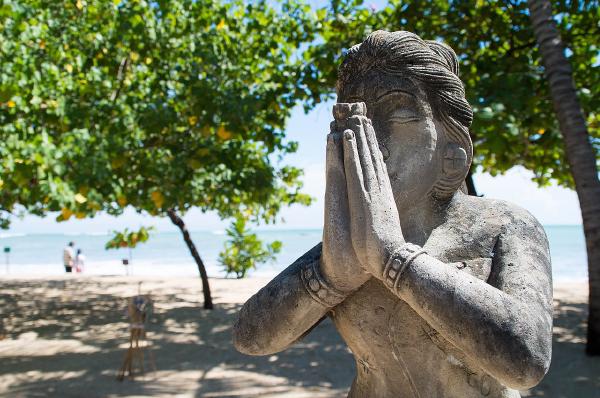Why I Won't Say "Namaste"

I was recently obliged to participate in a yoga session with my coworkers. My bosses felt that it would be a good team-building exercise (among other hippie-dippie activities like a mindfulness tutorial and nia dancing). As a Christian, this is a difficult thing to approach. Yoga is a practice drawn from a pagan religion.
Obviously I have no wish to take part in a pagan religion.
On the other hand, there are other practices (like certain martial arts) that have ties to pagan religions but which can be effectively separated from those roots.
I think it’s reasonable to assume that there are aspects of yoga that can be separated from the relgious roots and used for good. Simple things like stretching the muscles and improving flexibility.
Indeed, the session we went to was heavily watered down. As you would expect from a corporate type event, it was fairly sterile, stripped of the religious significance in an effort not to offend anyone or suggest any kind of troublesome moral obligation.
But there were a couple of elements that made me sit up and take notice.
The first was being told by the instructor that we all have feminine energy on our left side and masculine energy on our right side. Does the fact that I’m left-handed make any difference? No idea.
But what I do know is this: I don’t have feminine energy. I’m not a female. I have masculine energy only. That comes out in ways that the instructor may incorrectly call “feminine”. But there is nothing anti-masculine about being merciful, compassionate, gentle, creative. God reveals his character as being masculine, but God is all of those things. Though he is the eternal God, Jesus Christ is also a human man. None of these traits is incompatible with his masculinity.
The only feminine energy in my life is the one I’m married to.
But that aside, there was a final element that most would probably skip over. The session ended with the instructor saying to all of us “Namaste.” and the class repeating it back.
What does this word mean? Well, it is certainly used as a greeting in India. But that does not make it the same thing as “Hello” or “Goodbye” in English. Hebrew/Arabic speakers greet each other by saying “Shalom/Salam”. It’s the standard greeting. But it is also the word for “Peace”. It has much more meaning than a greeting.
So what does “Namaste” mean?
If you ask a practicing yogi, they will tell you that it means something like “the divine light in me seeks the divine light in you”.
Sounds all lovely and touchy-feely.
But it’s wrong.
The light they are talking about is the divine nature within me. They are not talking about indwelling of the Holy Spirit! In their view, we are all a part of God, you see. God is in everything. So when we interact, the divine part of us is reconnected to the divine in others.
It’s a statement of pantheism (that everything is God).
As a Christian, I cannot say that. Everything is not God. I am not God. Satan is not God. The ocean is not God. The stars are not God. God is separate from His creation.
Having a room full of people say “namaste” to each other is no different to having them go to church and recite the Lord’s Prayer or go to a mosque and say the shahada.
Effectively, they were asking us to participate in a religious practice at work.
Ain’t gonna happen.
As Christians we worship the God of Abraham, Isaac and Jacob, who raised the Lord Jesus from the dead. Christ is Lord over all and we will die before serving any other gods.
If you go to a yoga class, perhaps enjoy having a stretch if your conscience allows.
But don’t say “namaste”.